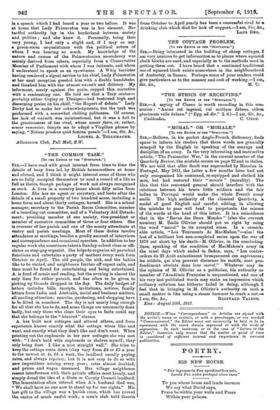" THE COMMON TASK." [To THE EDITOR OF THE "
SPECTATOR,"] Siu,-I have read with great interest from time to time the details of busy lives led by British housemothers at home and abroad, and I think it might interest some of those who are so fully occupied themselves to read a record of a life as full as theirs, though perhaps of work not always recognized as work. A. lives in a country house about fifty miles from London. She has no agent or secretary, and looks after the details of a small property of two hundred acres, including a home farm and about thirty cottages, herself. She is a school manager, secretary to the Parish Room Committee, member of a boarding-out committee, and of a Voluntary Aid Detach- ment ; presiding member of one society, vice-president or member of executive committee of three or four others. She is overseer of her parish and one of the scanty attendants at vestry and parish meetings. Most of these duties involve attendance at meetings, besides a goodly amount of interviews and correspondence and occasional speeches. In addition to her regular work she sometimes takes a Sunday-school class or offi- ciates as stop-gap organist. She helps to organize all parochial functions and entertains a party of mothers every week from October to April. The old people, the sick, and the babies like to be visited, and neighbours further off expect calls, and time must be found for entertaining and being entertained. A. is fond of music and reading, but the evening is almost the only time for either pursuit, and has often to be given to picking up threads dropped in the day. The daily budget of letters includes bills, receipts, invitations, notices, family letters from India and Australia, social and business matters, all needing attention; exercise, gardening, and shopping have to be fitted in somehow. The day is not nearly long enough for all that she has to do, and some things are necessarily done badly, but only those who close their eyes to facts could say that she belongs to the " leisured " classes.
A. has built new cottages and altered others, and from experience knows exactly what the cottage wives like and want, and exactly what they don't like and don't want. When pointing out the cupboards in her new cottages she was met with: "I don't hold with cupboards or shelves myself ; they only bring dust. I like a nice straight wall." She tries to keep the cottage rents down (they vary from £4 or £5 a year to the newest at 4s. 6(1. a week, the landlord usually paying rates, and always repairs) ; but it is not easy to do so with new impositions arising every year ; rates almost doubled, and prices and wages increased. Her village neighbours resent interference with their private affairs most keenly, and simply dread the idea of a State or County Council landlord. The lamentation often uttered when A.'s husband died was, " We shall have no one now to stand up for our rights." His last gift to the village was a parish room, which has proved the centre of much useful work; a men's club held therein
from October to April yearly has been a successful rival to a drinking club which died for lack of support.—I am, Sir, &c., LADS DEO,






































 Previous page
Previous page